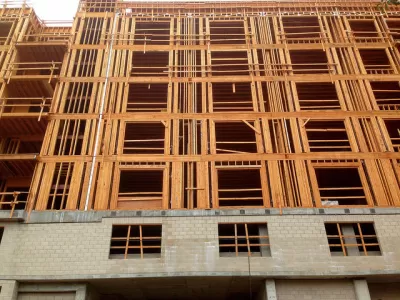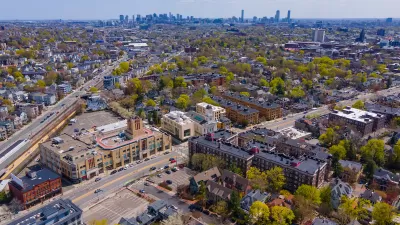Development impact fees in California triple the national average. A bill in the State Legislature would reform the state's development fees, as one measure in an effort to build more housing in the state.

A new study recommends reform for impact fees as a necessary step in response to the housing shortage and housing affordability crisis in California, according to an article by Louis Hansen.
The report [pdf], created by the Terner Center for Housing Innovation at the University of California, Berkeley and published on August 5, 2019 by the state Department of Housing and Community Development, will inform state legislators expected to debate the state's development fees.
"Cities depend on impact fees to build roads, schools and maintain parks and water systems," according to Hansen. "The money also allows municipalities to recoup costs for staff time spent on the projects. In an earlier study, Terner Center researchers found impact fees increased the cost of new units in some cities by up to 18 percent. California’s fees were nearly triple the national average."
"The report also recognized that California cities, limited in raising property taxes by Prop 13, lean heavily on impact fees to pay for services and upgrades to roads and utilities."
Assemblymember Tim Grayson, D-Concord, "plans to amend a bill on impact fee reform, AB 1484, to include recommendations from the report." The bill is on a tight schedule, according to the article—it has to get to Governor Gavin Newsom's desk by September.
Liam Dillon provides additional coverage of the report.
FULL STORY: California housing crisis: Development fees unpredictable, stifle construction

Planetizen Federal Action Tracker
A weekly monitor of how Trump’s orders and actions are impacting planners and planning in America.

San Francisco's School District Spent $105M To Build Affordable Housing for Teachers — And That's Just the Beginning
SFUSD joins a growing list of school districts using their land holdings to address housing affordability challenges faced by their own employees.

The Tiny, Adorable $7,000 Car Turning Japan Onto EVs
The single seat Mibot charges from a regular plug as quickly as an iPad, and is about half the price of an average EV.

As Trump Phases Out FEMA, Is It Time to Flee the Floodplains?
With less federal funding available for disaster relief efforts, the need to relocate at-risk communities is more urgent than ever.

With Protected Lanes, 460% More People Commute by Bike
For those needing more ammo, more data proving what we already knew is here.

In More Metros Than You’d Think, Suburbs are Now More Expensive Than the City
If you're moving to the burbs to save on square footage, data shows you should think again.
Urban Design for Planners 1: Software Tools
This six-course series explores essential urban design concepts using open source software and equips planners with the tools they need to participate fully in the urban design process.
Planning for Universal Design
Learn the tools for implementing Universal Design in planning regulations.
Smith Gee Studio
City of Charlotte
City of Camden Redevelopment Agency
City of Astoria
Transportation Research & Education Center (TREC) at Portland State University
US High Speed Rail Association
City of Camden Redevelopment Agency
Municipality of Princeton (NJ)





























